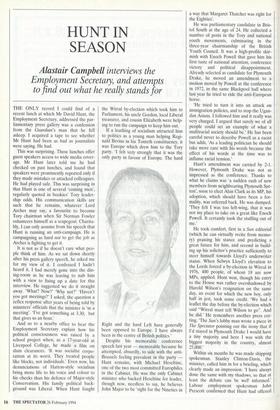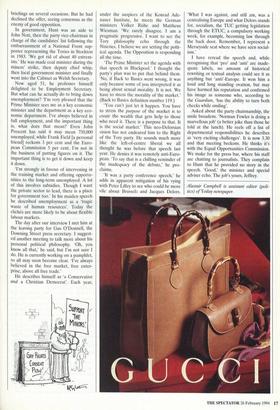HUNT IN SEASON
Alastair Campbell interviews the
Employment Secretary, and attempts to find out what he really stands for
THE ONLY record I could find of a recent lunch at which Mr David Hunt, the Employment Secretary, addressed the par- liamentary press gallery was a confession from the Guardian's man that he fell asleep. I acquired a tape to see whether Mr Hunt had been as bad as journalists were saying. He had.
This was surprising. These lunches offer guest speakers access to wide media cover- age. Mr Hunt later told me he had checked on past lunches, and found that speakers were prominently reported only if they made mistakes or attacked colleagues. He had played safe. This was surprising in that Hunt is one of several 'coming men', regularly quoted in bookies' Tory leader- ship odds. His communication skills are such that he remains, whatever Lord Archer may say, a favourite to become Tory chairman when Sir Norman Fowler volunteers himself as a scapegoat. Charita- bly, I can only assume from his speech that Hunt is running an anti-campaign. He is campaigning as hard not to get the job as Ascher is fighting to get it.
It is not as if he doesn't care what peo- ple think of him. As we sat down shortly after his press gallery speech, he asked me for my view of it. I confessed I hadn't heard it. I had merely gone into the din- ing-room as he was leaving to nab him with a view to fixing up a date for this interview. He suggested we do it straight away. 'What? Now?' Why not?' Haven't you got meetings?' I asked, the question a reflex response after years of being told by ministers' officials that the minister is 'in a meeting'. 'I've got something at 3.30, but that gives us an hour.'
And so to a nearby office to hear the Employment Secretary explain how his political consciousness was raised by a school project when, as a 17-year-old at Liverpool College, he made a film on slum clearances. 'It was socialist corpo- ratism at its worst. They treated people like blocks, not individuals.' Even now, his denunciations of Hatton-style socialism bring more life to his voice and colour to his cheeks than his defence of Major-style Conservatism. His family political back- ground was Liberal. When Hunt fought the Wirral by-election which took him to Parliament, his uncle Gordon, local Liberal treasurer, and cousin Elizabeth were help- ing to run the campaign to keep him out.
If a loathing of socialism attracted him to politics as a young man helping Regi- nald Bevins in his Toxteth constituency, it was Europe which drew him to the Tory party. 'I felt very strongly that it was the only party in favour of Europe. The hard Right and the hard Left have generally been opposed to Europe. I have always been in the centre of British politics.'
Despite his memorable conference speech last year — memorable because he attempted, absurdly, to side with the anti- Brussels feeling prevalent in the party — Hunt remains, with Michael Hese!tine, one of the two most committed Europhiles in the Cabinet. He was the only Cabinet minister who backed Heseltine for leader, though now, needless to say, he believes John Major to be 'right for the Nineties in a way that Margaret Thatcher was right for the Eighties'.
He was parliamentary candidate in Bris- tol South at the age of 24. He collected a number of posts in the Tory and national youth movements, culminating in the three-year chairmanship of the British Youth Council. It was a high-profile skir- mish with Enoch Powell that gave him his first taste of national attention, conference victory and political disappointment. Already selected as candidate for Plymouth Drake, he moved an amendment to a motion moved by Powell at the conference in 1972, in the same Blackpool hall where last year he tried to ride the anti-European horse.
'He tried to turn it into an attack on immigration policies, and to stop the Ugan- dan Asians. I followed him and it really was very charged. I argued that surely we of all people could set an example of what a multiracial society should be.' He has been careful never to describe Powell as a racist but adds, 'As a leading politician he should take more care with his words because the effect of his words at the time was to inflame racial tension.'
Hunt's amendment was carried by 2-1. However, Plymouth Drake was not as impressed as the conference. Thanks to what he claims was 'a sudden rush of new members from neighbouring Plymouth Sut- ton', soon to elect Alan Clark as its MP, his adoption, which should have been a for- mality, was referred back. He was dumped.
'They felt I was too left-wing, that it was not my place to take on a great like Enoch Powell. It certainly took the stuffing out of me.'
He took comfort, first in a Sun editorial (which he can virtually recite from memo-
ry) praising his stance and predicting a great future for him, and second in build- ing up his solicitor's practice sufficiently to steer himself towards Lloyd's underwriter status. When Selwyn Lloyd's elevation to the Lords forced a by-election in Wirral in 1976, 400 people, of whom 18 are now MPs, applied. Hunt won, though his entry to the House was rather overshadowed by Harold Wilson's resignation on the same day, an event for which the new boy, only half in jest, took some credit. 'We had a leaflet the day before the by-election which said "Wirral must tell Wilson to go". And he did.' He remembers another press cut- ting. 'The Sun's lobby man wrote a piece in
The Spectator pointing out the irony that if I'd stayed in Plymouth Drake I would have
a tiny majority and here I was with the biggest majority in the country, almost 25,000.'
Within six months he was made shipping spokesman. Stanley Clinton-Davis, the minister, called him in for a briefing, which clearly made an impression. 'I have always done the same with my shadows, so that at least the debate can be well informed.' Labour employment spokesman John Prescott confirmed that Hunt had offered briefings on several occasions. But he had declined the offer, seeing consensus as the enemy of good opposition.
In government, Hunt was an aide to John Nott, then the party vice-chairman in charge of the candidates' list following the embarrassment of a National Front sup- porter representing the Tories in Stockton in 1983. 'We got rid of about 40 extrem- ists.' He was made coal minister during the miners' strike, then deputy chief whip, then local government minister and finally went into the Cabinet as Welsh Secretary.
Now aged 51, he professes himself delighted to be Employment Secretary. But what can he actually do to bring down unemployment? `I'm very pleased that the Prime Minister sees me as a key economic minister and the department as a key eco- nomic department. I've always believed in full employment, and the important thing is, what does that mean? Even John Prescott has said it may mean 750,000 unemployed, while Frank Field [a personal friend] reckons 3 per cent and the Euro- pean Commission 5 per cent. I'm not in the business of putting figures on it. The important thing is to get it down and keep it down.
`I'm strongly in favour of intervening in the training market and offering opportu- nities to the long-term unemployed. A lot of this involves subsidies. Though I want the private sector to lead, there is a place for government too.' In his maiden speech he described unemployment as a `tragic waste of human resources'. Today the clichés are more likely to be about flexible labour markets.
The day after our interview I met him at the leaving party for Gus O'Donnell, the Downing Street press secretary. I suggest- ed another meeting to talk more about his personal political philosophy. 'Oh, you know all that,' he said, but I'm not sure I do. He is currently working on a pamphlet, so all may soon become clear. Tye always believed in the free market, free enter- prise, above all free trade.'
He describes himself as `a Conservative and a Christian Democrat'. Each year,
under the auspices of the Konrad Ade- nauer Institute, he meets the German ministers Volker Riihe and Mattheus Wiesman. `We rarely disagree. I am a pragmatic progressive. I want to see the Tory philosophy echo through the Nineties. I believe we are setting the polit- ical agenda. The Opposition is responding all the time.
'The Prime Minister set the agenda with that speech in Blackpool.' I thought the party's plan was to put that behind them. `No, if Back to Basics went wrong, it was only because some of you interpreted it as being about sexual morality. It is not. We have to stress the morality of the market.' (Back to Basics definition number 119.)
`You can't just let it happen. You have to stress the purpose of the market is to create the wealth that gets help to those who need it. There is a purpose to that. It is the social market.' This neo-Delorsian vision has not endeared him to the Right of the Tory party. He sounds much more like the left-of-centre liberal we all thought he was before that speech last year. He denies it was remotely anti-Euro- pean. `To say that is a chilling reminder of the inadequacy of the debate,' he pro- claims.
`It was a party conference speech,' he adds in apparent mitigation of his vying with Peter Lilley to see who could be more vile about Brussels and Jacques Delors. `What I was against, and still am, was a centralising Europe and what Delors stands for, socialism, the TUC getting legislation through the ETUC, a compulsory working week, for example, becoming law through the back door. Remember, I represent a Merseyside seat where we have seen social- ism.'
I have reread the speech and, while recognising that `pro' and `anti' are inade- quate labels, no amount of historical rewriting or textual analysis could see it as anything but `anti'-Europe. It won him a loud and long standing ovation, but may have harmed his reputation and confirmed his image as someone who, according to the Guardian, `has the ability to turn both cheeks while smiling'.
Asked about the party chairmanship, the smile broadens. `Norman Fowler is doing a marvellous job' (a better joke than those he told at the lunch). He reels off a list of departmental responsibilities he describes as `very exciting challenges'. It is now 3.30 and that meeting beckons. He thinks it's with the Equal Opportunities Commission. We make for the press bar, where his staff are chatting to journalists. They complain to Hunt that he provided no story in the speech. `Good,' the minister and special adviser echo. The job's yours, Jeffrey.
Alastair Campbell is assistant editor (poli- tics) of Today newspaper.



























































 Previous page
Previous page